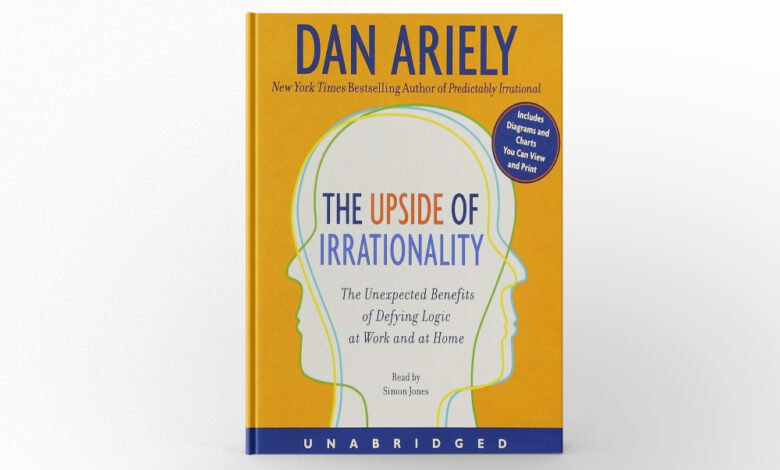The Upside of Irrationality by Dan Ariely
Embracing the Unexpected: “The Upside of Irrationality” by Dan Ariely

“The Upside of Irrationality by Dan Ariely” is a fascinating exploration of how our irrational behaviors can lead to surprisingly positive outcomes. This book delves into the quirks of human decision-making, revealing that our seemingly illogical actions often have hidden benefits. Ariely, a renowned behavioral economist, uses a blend of humor, personal anecdotes, and scientific research to challenge traditional economic theories and offer new insights into human behavior. In this article, we will explore the book’s content, themes, and the author’s background, providing a comprehensive overview of why “The Upside of Irrationality” is a must-read.
Author’s Background
Dan Ariely is a prominent figure in the field of behavioral economics, known for his groundbreaking research on human behavior and decision-making. Born in New York City and raised in Israel, Ariely’s life took a dramatic turn when he suffered severe burns in an accident at the age of 18. This experience sparked his interest in understanding human behavior, particularly how people make decisions under stress and uncertainty. Ariely holds a Ph.D. in cognitive psychology from the University of North Carolina and a Ph.D. in business administration from Duke University. He is a professor of psychology and behavioral economics at Duke University and the founder of the Center for Advanced Hindsight. Ariely’s previous works, including “Predictably Irrational,” have garnered widespread acclaim, establishing him as a leading voice in his field.
In-Depth Summary
“The Upside of Irrationality by Dan Ariely” is divided into two parts, each focusing on different aspects of irrational behavior and its implications.
Part One: The Unexpected Benefits of Defying Logic
- The IKEA Effect: Ariely introduces the concept of the IKEA Effect, which suggests that people place a higher value on things they have partially created themselves. This phenomenon explains why we might overvalue our own work or creations, even if they are objectively no better than others. Ariely’s experiments demonstrate how this bias can influence our decisions in various contexts, from assembling furniture to completing work projects.
- The Not-Invented-Here Bias: This chapter explores our tendency to favor our own ideas over those of others, even when the latter might be more effective. Ariely illustrates this bias through examples from corporate settings, showing how it can hinder innovation and collaboration.
- The Effort Paradox: Ariely examines the relationship between effort and reward, revealing that we often derive more satisfaction from tasks that require greater effort. This paradox challenges the conventional wisdom that easier tasks are always preferable and highlights the intrinsic value of hard work.
- The Meaning of Labor: This chapter delves into the importance of meaningful work, arguing that people are more motivated and productive when they find purpose in their tasks. Ariely’s research shows how even small changes in the perception of work can significantly impact performance and satisfaction.
- The Long-Term Effects of Short-Term Emotions: Ariely discusses how our immediate emotions can influence long-term decisions, often leading to irrational outcomes. He provides insights into how we can better manage our emotions to make more rational choices.
Part Two: The Unexpected Downsides of Defying Logic
- The Online Dating Dilemma: Ariely explores the irrational behaviors associated with online dating, such as the tendency to overvalue superficial traits. He offers practical advice on how to navigate the complexities of online dating to find more meaningful connections.
- The Problem with Procrastination and Self-Control: This chapter examines the common struggle with procrastination and the irrational ways we try to manage it. Ariely’s experiments reveal the underlying causes of procrastination and suggest strategies for improving self-control.
- The High Price of Ownership: Ariely introduces the concept of the Endowment Effect, which explains why we often overvalue things simply because we own them. This bias can lead to irrational financial decisions, such as holding onto investments for too long or overpricing items we want to sell.
- The Influence of Arousal: This chapter explores how heightened emotional states, such as anger or excitement, can impair our judgment and lead to irrational decisions. Ariely’s research highlights the importance of recognizing and mitigating the effects of arousal on our behavior.
- The Impact of Expectations: Ariely discusses how our expectations can shape our experiences and perceptions, often leading to self-fulfilling prophecies. He provides examples from various domains, including medicine and education, to illustrate the powerful influence of expectations.
Themes and Insights
“The Upside of Irrationality by Dan Ariely” explores several profound themes:
- Behavioral Economics: The book challenges traditional economic theories by highlighting the irrational aspects of human behavior. Ariely’s research demonstrates that our decisions are often influenced by biases and emotions, rather than pure logic.
- The Value of Effort: Ariely emphasizes the intrinsic value of effort and hard work, showing that tasks requiring greater effort can lead to higher satisfaction and motivation.
- The Role of Emotions: The book explores how emotions impact our decisions, often leading to irrational outcomes. Ariely provides insights into how we can better manage our emotions to make more rational choices.
- The Power of Expectations: Ariely highlights the significant influence of expectations on our experiences and perceptions, suggesting that managing expectations can lead to more positive outcomes.
Recommendation
“The Upside of Irrationality by Dan Ariely” is a must-read for anyone interested in understanding the quirks of human behavior and decision-making. Its engaging narrative, relatable examples, and practical insights make it accessible to a wide audience. The book is particularly valuable for students, professionals, and anyone looking to improve their decision-making skills. Ariely’s blend of humor and scientific rigor ensures that readers will not only learn but also enjoy the journey through the fascinating world of behavioral economics.
Conclusion
In “The Upside of Irrationality by Dan Ariely,” readers are invited to explore the unexpected benefits and downsides of our irrational behaviors. Ariely’s masterful storytelling and profound insights make this book a powerful and enlightening read. By challenging traditional economic theories and highlighting the complexities of human behavior, “The Upside of Irrationality” inspires readers to embrace their irrationality and harness its potential for positive outcomes.




